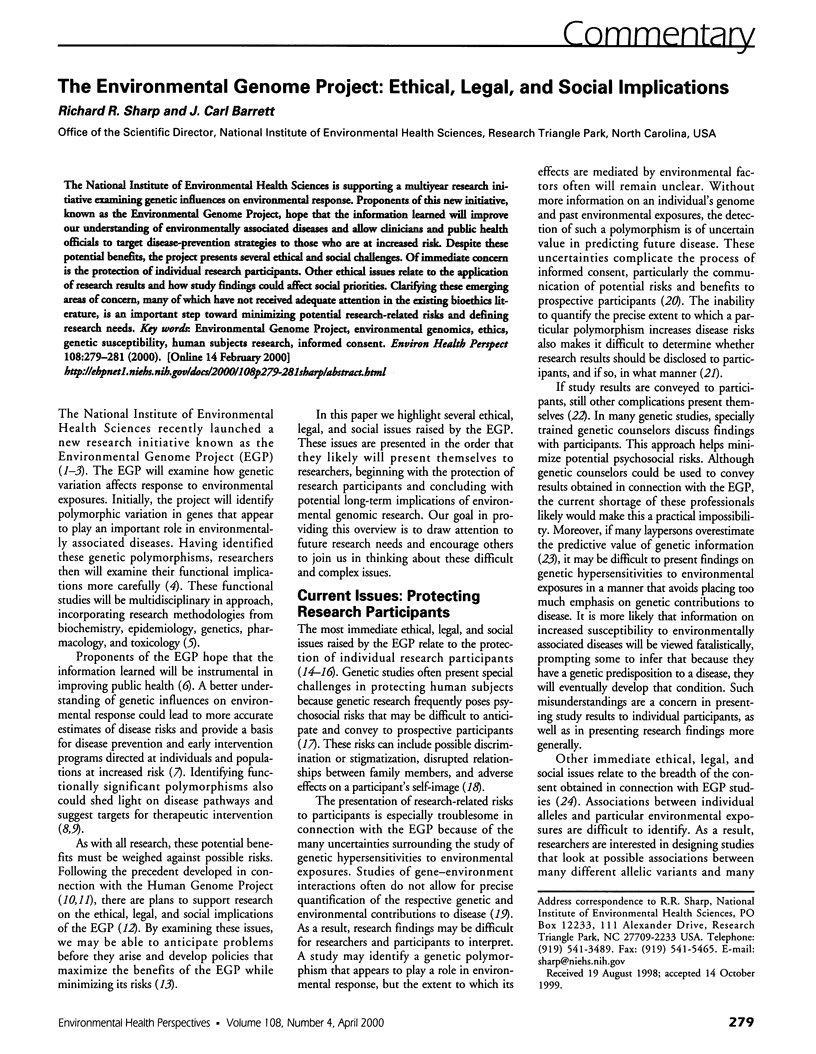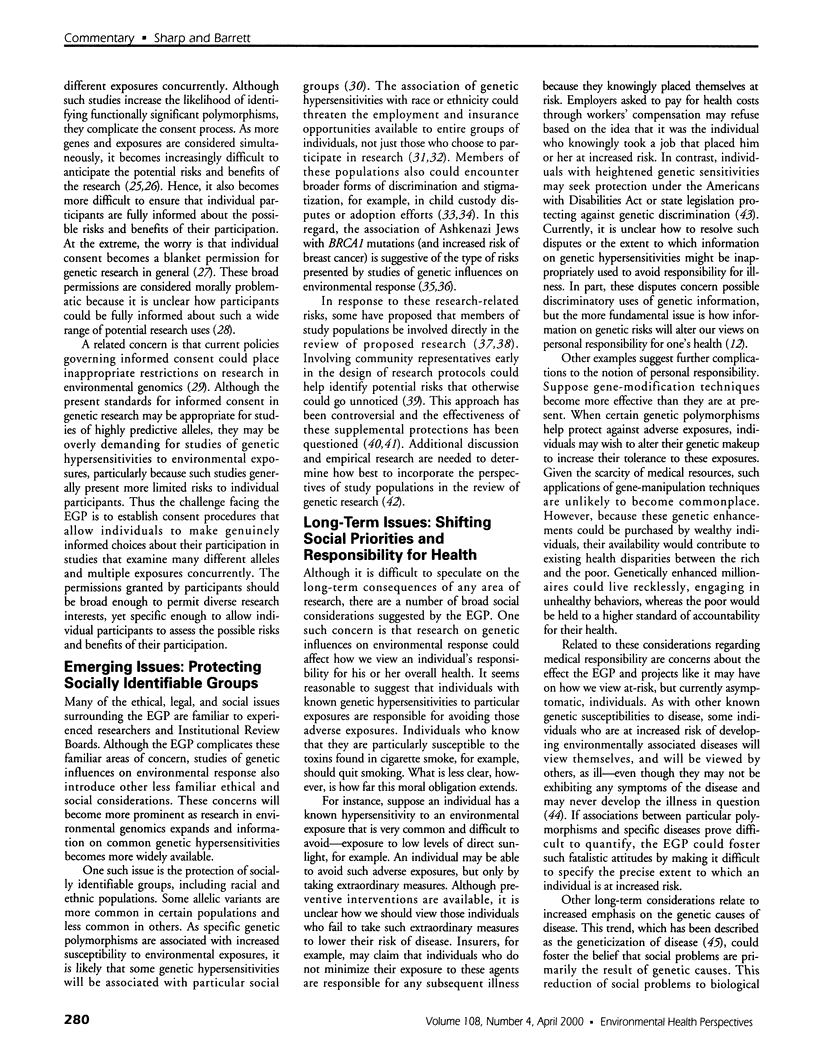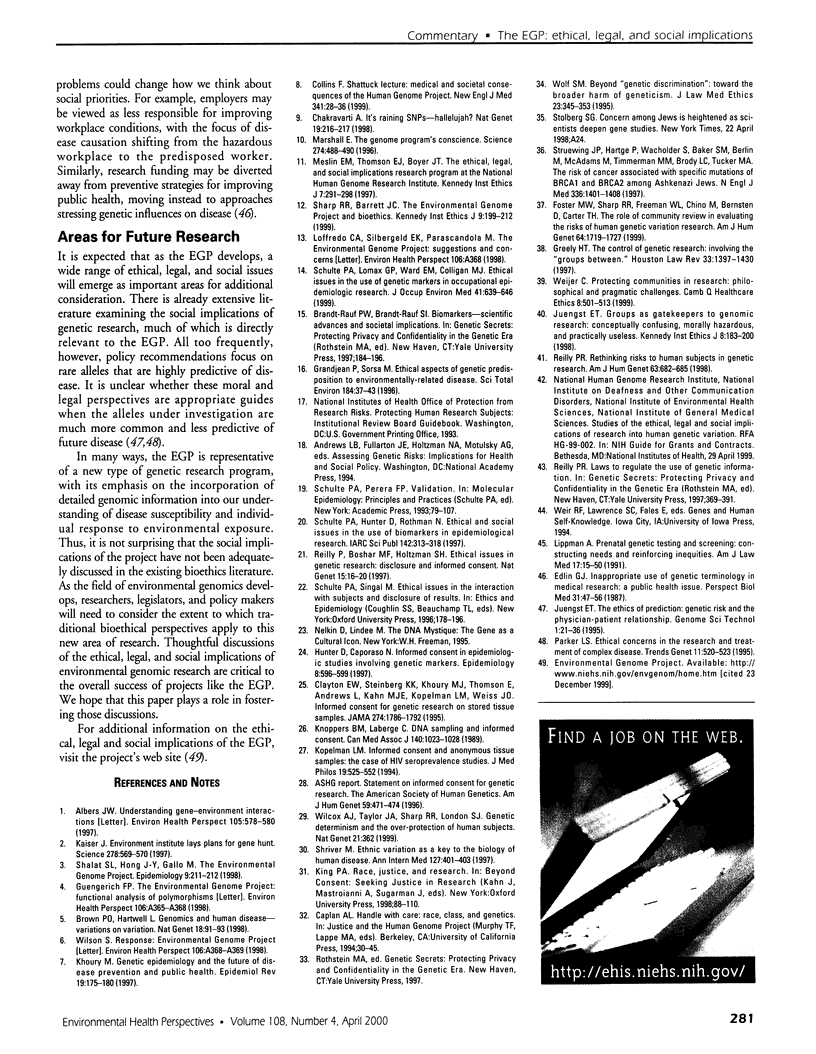Abstract
The National Institute of Environmental Health Sciences is supporting a multiyear research initiative examining genetic influences on environmental response. Proponents of this new initiative, known as the Environmental Genome Project, hope that the information learned will improve our understanding of environmentally associated diseases and allow clinicians and public health officials to target disease-prevention strategies to those who are at increased risk. Despite these potential benefits, the project presents several ethical and social challenges. Of immediate concern is the protection of individual research participants. Other ethical issues relate to the application of research results and how study findings could affect social priorities. Clarifying these emerging areas of concern, many of which have not received adequate attention in the existing bioethics literature, is an important step toward minimizing potential research-related risks and defining research needs.
Full text
PDF


Selected References
These references are in PubMed. This may not be the complete list of references from this article.
- Albers J. W. Understanding gene-environment interactions. Environ Health Perspect. 1997 Jun;105(6):578–580. doi: 10.1289/ehp.97105578. [DOI] [PMC free article] [PubMed] [Google Scholar]
- Brown P. O., Hartwell L. Genomics and human disease--variations on variation. Nat Genet. 1998 Feb;18(2):91–93. doi: 10.1038/ng0298-91. [DOI] [PubMed] [Google Scholar]
- Chakravarti A. It's raining SNPs, hallelujah? Nat Genet. 1998 Jul;19(3):216–217. doi: 10.1038/885. [DOI] [PubMed] [Google Scholar]
- Clayton E. W., Steinberg K. K., Khoury M. J., Thomson E., Andrews L., Kahn M. J., Kopelman L. M., Weiss J. O. Informed consent for genetic research on stored tissue samples. JAMA. 1995 Dec 13;274(22):1786–1792. [PubMed] [Google Scholar]
- Collins F. S. Shattuck lecture--medical and societal consequences of the Human Genome Project. N Engl J Med. 1999 Jul 1;341(1):28–37. doi: 10.1056/NEJM199907013410106. [DOI] [PubMed] [Google Scholar]
- Edlin G. J. Inappropriate use of genetic terminology in medical research: a public health issue. Perspect Biol Med. 1987 Autumn;31(1):47–56. doi: 10.1353/pbm.1987.0018. [DOI] [PubMed] [Google Scholar]
- Grandjean P., Sorsa M. Ethical aspects of genetic predisposition to environmentally-related disease. Sci Total Environ. 1996 May 17;184(1-2):37–43. doi: 10.1016/0048-9697(95)04986-x. [DOI] [PubMed] [Google Scholar]
- Greely H. T. The control of genetic research: involving the "groups between". Houst Law Rev. 1997;33(5):1397–1430. [PubMed] [Google Scholar]
- Hunter D., Caporaso N. Informed consent in epidemiologic studies involving genetic markers. Epidemiology. 1997 Sep;8(5):596–599. [PubMed] [Google Scholar]
- Juengst Eric T. Ethics of prediction: genetic risk and the physician-patient relationship. Genome Sci Technol. 1995;1(1):21–36. doi: 10.1089/gst.1995.1.21. [DOI] [PubMed] [Google Scholar]
- Juengst Eric T. Groups as gatekeepers to genomic research: conceptually confusing, morally hazardous, and practically useless. Kennedy Inst Ethics J. 1998 Jun;8(2):183–200. doi: 10.1353/ken.1998.0010. [DOI] [PubMed] [Google Scholar]
- Kaiser J. Environment institute lays plans for gene hunt. Science. 1997 Oct 24;278(5338):569–570. doi: 10.1126/science.278.5338.569. [DOI] [PubMed] [Google Scholar]
- Khoury M. J. Genetic epidemiology and the future of disease prevention and public health. Epidemiol Rev. 1997;19(1):175–180. doi: 10.1093/oxfordjournals.epirev.a017940. [DOI] [PubMed] [Google Scholar]
- Knoppers B. M., Laberge C. DNA sampling and informed consent. CMAJ. 1989 May 1;140(9):1023–1028. [PMC free article] [PubMed] [Google Scholar]
- Kopelman L. M. Informed consent and anonymous tissue samples: the case of HIV seroprevalence studies. J Med Philos. 1994 Dec;19(6):525–552. doi: 10.1093/jmp/19.6.525. [DOI] [PubMed] [Google Scholar]
- Lippman A. Prenatal genetic testing and screening: constructing needs and reinforcing inequities. Am J Law Med. 1991;17(1-2):15–50. [PubMed] [Google Scholar]
- Loffredo C. A., Silbergeld E. K., Parascandola M. The Environmental Genome Project: suggestions and concerns. Environ Health Perspect. 1998 Aug;106(8):A368–A369. doi: 10.1289/ehp.106-1533216. [DOI] [PMC free article] [PubMed] [Google Scholar]
- Marshall E. The genome project's conscience. Science. 1996 Oct 25;274(5287):488–490. doi: 10.1126/science.274.5287.488. [DOI] [PubMed] [Google Scholar]
- Parker L. S. Ethical concerns in the research and treatment of complex disease. Trends Genet. 1995 Dec;11(12):520–523. doi: 10.1016/s0168-9525(00)89164-7. [DOI] [PubMed] [Google Scholar]
- Reilly P. R., Boshar M. F., Holtzman S. H. Ethical issues in genetic research: disclosure and informed consent. Nat Genet. 1997 Jan;15(1):16–20. doi: 10.1038/ng0197-16. [DOI] [PubMed] [Google Scholar]
- Reilly P. R. Rethinking risks to human subjects in genetic research. Am J Hum Genet. 1998 Sep;63(3):682–685. doi: 10.1086/302028. [DOI] [PMC free article] [PubMed] [Google Scholar]
- Schulte P. A., Hunter D., Rothman N. Ethical and social issues in the use of biomarkers in epidemiological research. IARC Sci Publ. 1997;(142):313–318. [PubMed] [Google Scholar]
- Schulte P. A., Lomax G. P., Ward E. M., Colligan M. J. Ethical issues in the use of genetic markers in occupational epidemiologic research. J Occup Environ Med. 1999 Aug;41(8):639–646. doi: 10.1097/00043764-199908000-00005. [DOI] [PubMed] [Google Scholar]
- Shalat S. L., Hong J. Y., Gallo M. The Environmental Genome Project. Epidemiology. 1998 Mar;9(2):211–212. doi: 10.1097/00001648-199803000-00020. [DOI] [PubMed] [Google Scholar]
- Shriver M. D. Ethnic variation as a key to the biology of human disease. Ann Intern Med. 1997 Sep 1;127(5):401–403. doi: 10.7326/0003-4819-127-5-199709010-00011. [DOI] [PubMed] [Google Scholar]
- Struewing J. P., Hartge P., Wacholder S., Baker S. M., Berlin M., McAdams M., Timmerman M. M., Brody L. C., Tucker M. A. The risk of cancer associated with specific mutations of BRCA1 and BRCA2 among Ashkenazi Jews. N Engl J Med. 1997 May 15;336(20):1401–1408. doi: 10.1056/NEJM199705153362001. [DOI] [PubMed] [Google Scholar]
- Weijer C. Protecting communities in research: philosophical and pragmatic challenges. Camb Q Healthc Ethics. 1999 Fall;8(4):501–513. doi: 10.1017/s0963180199004120. [DOI] [PubMed] [Google Scholar]
- Wilcox A. J., Taylor J. A., Sharp R. R., London S. J. Genetic determinism and the overprotection of human subjects. Nat Genet. 1999 Apr;21(4):362–362. doi: 10.1038/7692. [DOI] [PubMed] [Google Scholar]
- Wolf S. M. Beyond "genetic discrimination": toward the broader harm of geneticism. J Law Med Ethics. 1995 Winter;23(4):345–353. doi: 10.1111/j.1748-720x.1995.tb01376.x. [DOI] [PubMed] [Google Scholar]


